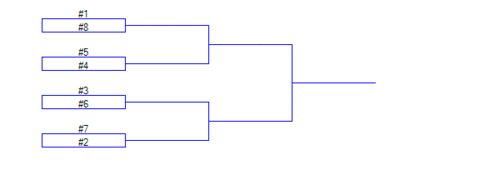Seeding: Difference between revisions
(Added a snippet about Round Robin seeding.) |
m (Some of this is already mentioned on the Tournament page, so I'm rewriting this part to make it relevant to the article. RR pools FTW.) |
||
| Line 2: | Line 2: | ||
{{competitive-stub}} | {{competitive-stub}} | ||
[[File:Seededbracket.gif|thumb|500px|An example of a perfectly seeded bracket.]] | [[File:Seededbracket.gif|thumb|500px|An example of a perfectly seeded bracket.]] | ||
'''Seeding''' is the act of arranging players in a tournament bracket, usually to equalize both or all sides of the bracket in terms of skill, and so that the best players do not face each other until later rounds. Seeding is used so that players will usually receive placements proportianate to their skill levels. The name comes from the fact that a seed may either grow into the top-notch plant (i.e. the best player) or wither away (i.e. elimination). For example, in the first round of a perfectly seeded 8-player bracket, the best player, #1, competes with the worst player, #8. #2 competes with #7, #3 competes with #6, and #4 competes with #5. By seeding in this fashion, #1 and #2 will only face each other in the final round and will likely get 1st and 2nd place respectively, and lower-level players, having been eliminated by better players, will likely receive lower placements. If the bracket was not seeded properly, the best player, #1, could beat the second best player, #2, in the first round, and lower-level players would be able to advance farther due to weaker opponents being faced. In this situation, a weaker player could receive a higher placement than player #2. | '''Seeding''' is the act of arranging players in a tournament bracket, usually to equalize both or all sides of the bracket in terms of skill, and so that the best players do not face each other until later rounds. Seeding is used so that players will usually receive placements proportianate to their skill levels. The name comes from the fact that a seed may either grow into the top-notch plant (i.e. the best player) or wither away (i.e. elimination). For example, in the first round of a perfectly seeded 8-player bracket, the best player, #1, competes with the worst player, #8. #2 competes with #7, #3 competes with #6, and #4 competes with #5. By seeding in this fashion, #1 and #2 will only face each other in the final round and will likely get 1st and 2nd place respectively, and lower-level players, having been eliminated by better players, will likely receive lower placements. If the bracket was not seeded properly, the best player, #1, could beat the second best player, #2, in the first round, and lower-level players would be able to advance farther due to weaker opponents being faced. In this situation, a weaker player could receive a higher placement than player #2. | ||
One form of seeding, especially for larger tournaments, is to use many small | |||
One form of seeding, especially for larger tournaments, is to use many small round-robin pools. In a round-robin pool, players are ranked within their pool and seeded into the bracket, with their first-round bracket match being against a higher/lower-ranked player from another pool to balance skill levels in each section of the bracket.. For example, in a tournament using round-robin pools, the top 2 players advance to the bracket. A player who places 1st in their pool will be paired up against a player who placed 2nd in another pool. | |||
[[Category:Competitive play]] | [[Category:Competitive play]] | ||
Revision as of 18:56, September 27, 2014
Seeding is the act of arranging players in a tournament bracket, usually to equalize both or all sides of the bracket in terms of skill, and so that the best players do not face each other until later rounds. Seeding is used so that players will usually receive placements proportianate to their skill levels. The name comes from the fact that a seed may either grow into the top-notch plant (i.e. the best player) or wither away (i.e. elimination). For example, in the first round of a perfectly seeded 8-player bracket, the best player, #1, competes with the worst player, #8. #2 competes with #7, #3 competes with #6, and #4 competes with #5. By seeding in this fashion, #1 and #2 will only face each other in the final round and will likely get 1st and 2nd place respectively, and lower-level players, having been eliminated by better players, will likely receive lower placements. If the bracket was not seeded properly, the best player, #1, could beat the second best player, #2, in the first round, and lower-level players would be able to advance farther due to weaker opponents being faced. In this situation, a weaker player could receive a higher placement than player #2.
One form of seeding, especially for larger tournaments, is to use many small round-robin pools. In a round-robin pool, players are ranked within their pool and seeded into the bracket, with their first-round bracket match being against a higher/lower-ranked player from another pool to balance skill levels in each section of the bracket.. For example, in a tournament using round-robin pools, the top 2 players advance to the bracket. A player who places 1st in their pool will be paired up against a player who placed 2nd in another pool.

